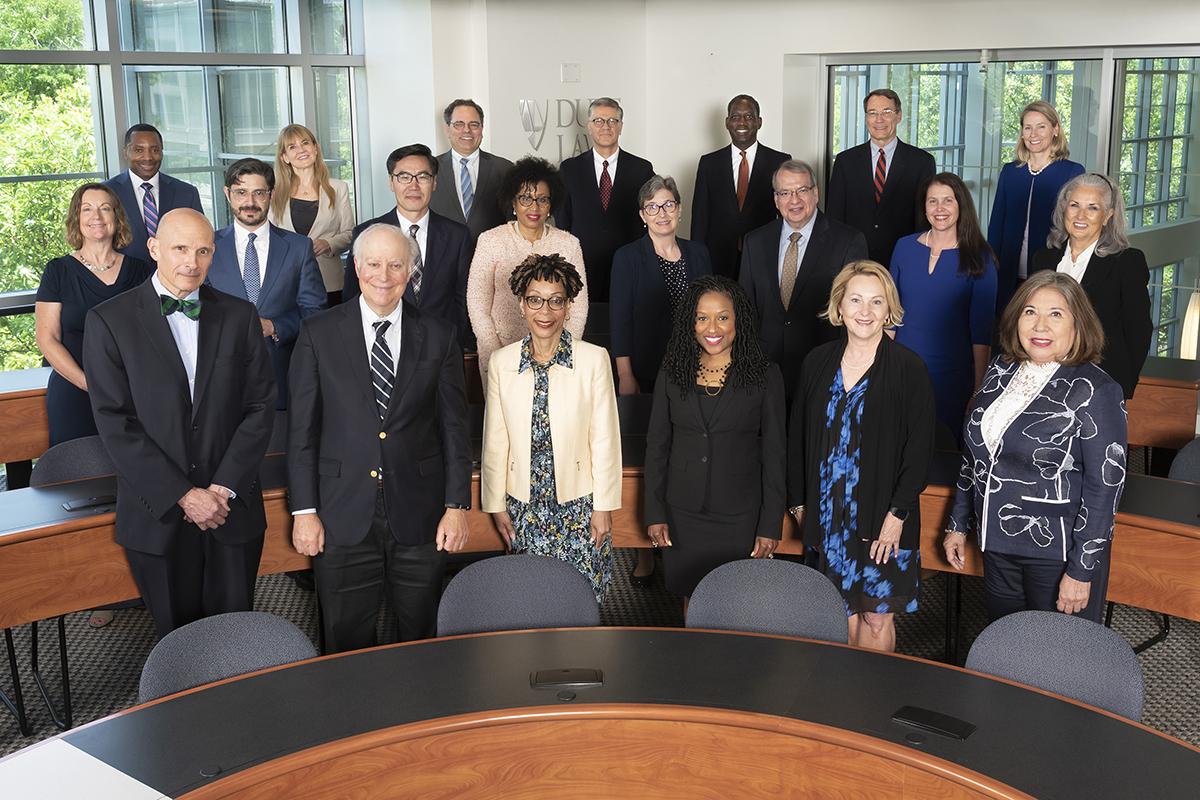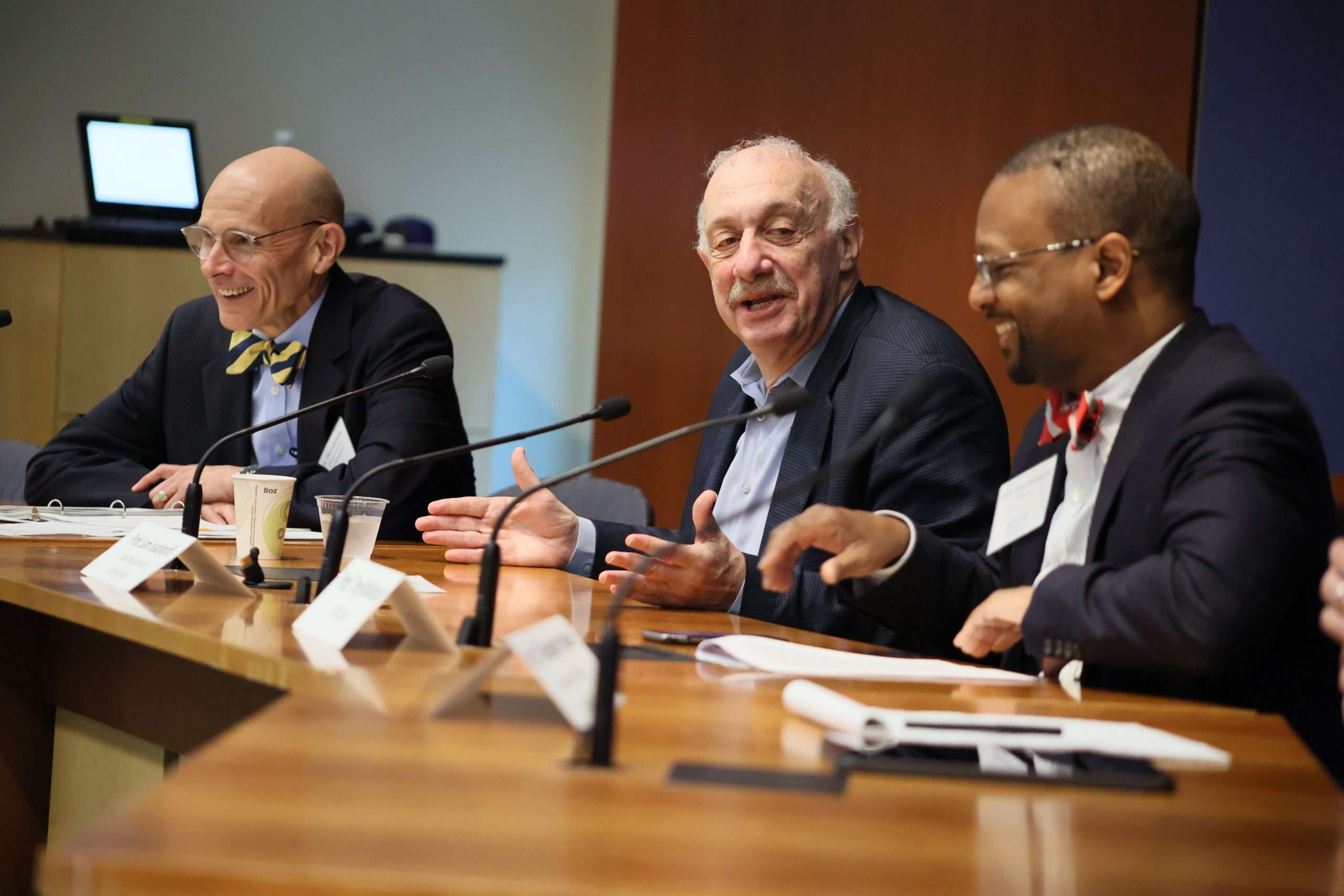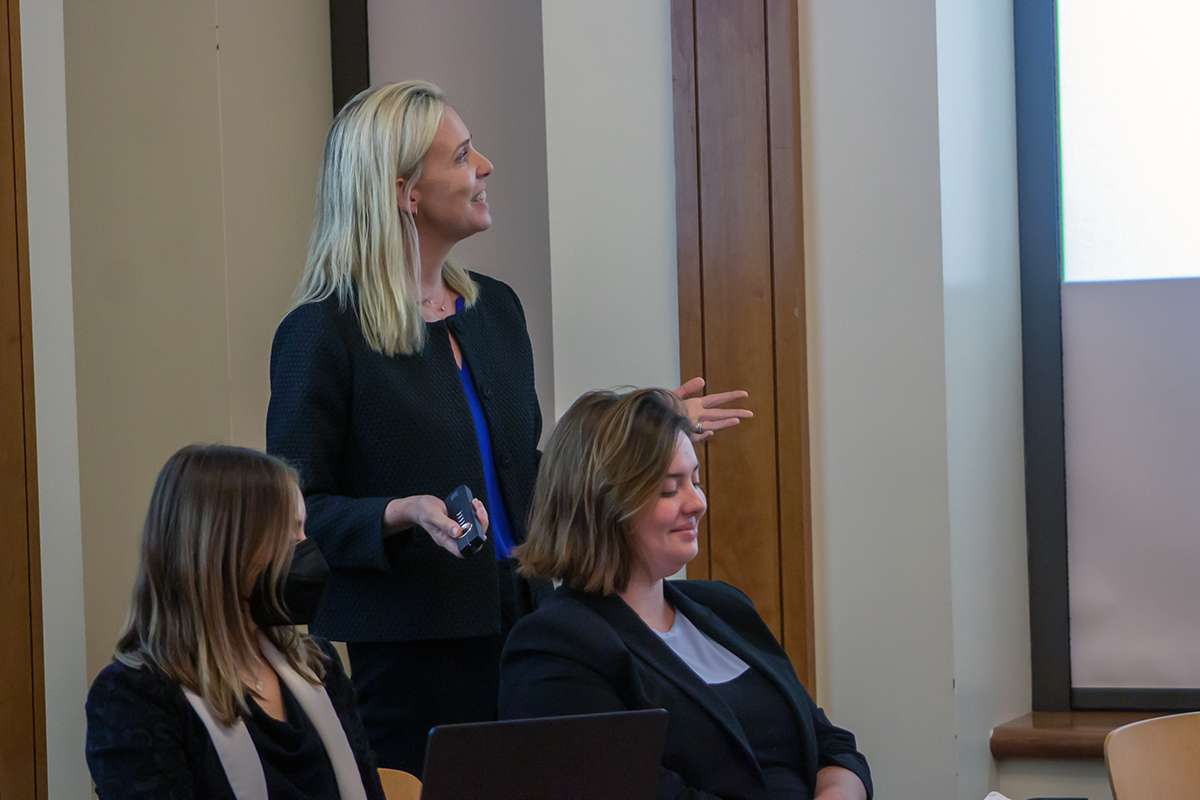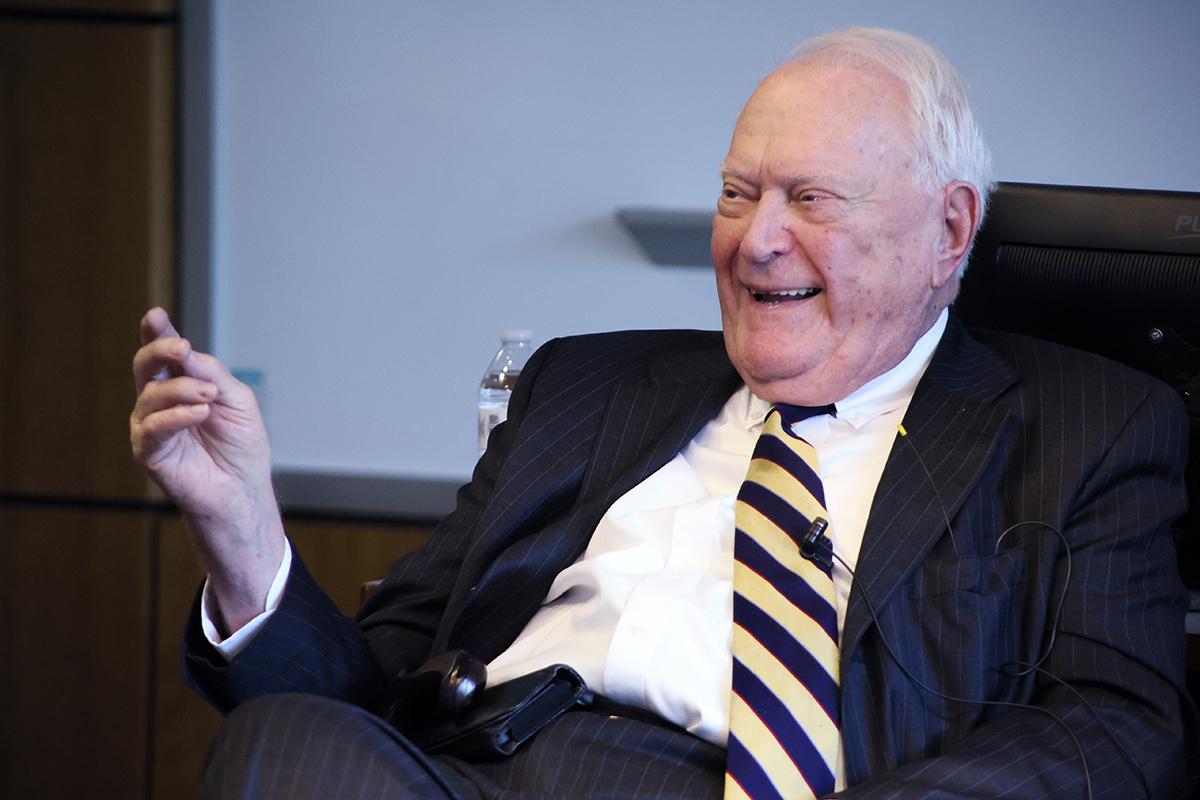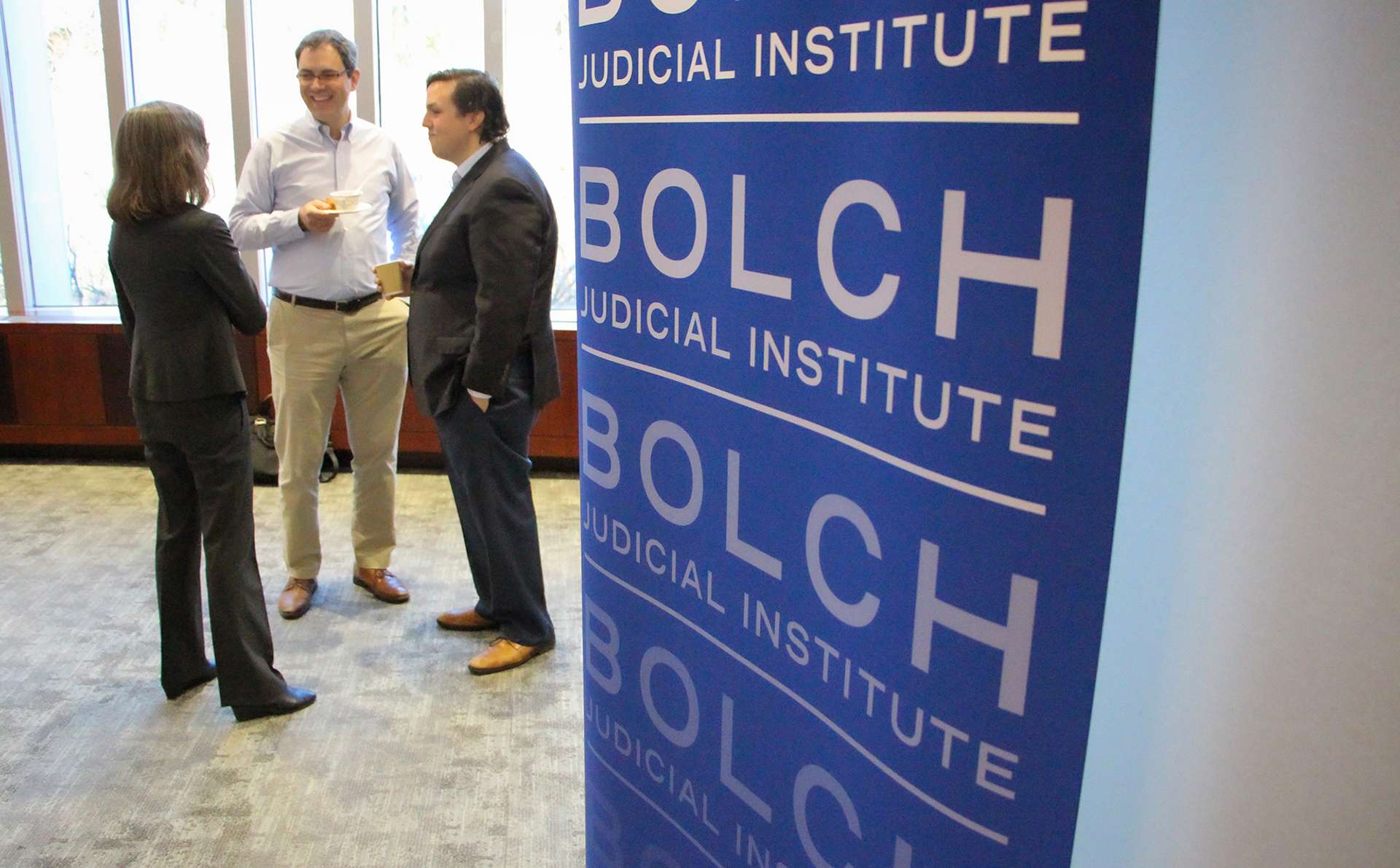PICTURED ABOVE: Susan Bass Bolch and members of the Institute’s executive leadership team participated in a ribbon cutting celebration on May 20, 2022, for the Bolch Prize pedestal installed at Duke Law School. Click here to watch a video recap of the celebration.
Dear Friends,
I am pleased to enclose a report on the Bolch Judicial Institute’s activities for the 2021-22 academic year. It was wonderful to return to classrooms with our LLM judges and law students, to celebrate our 2022 Bolch Prize program in person and in such a beautiful location, and to reinvigorate so many of our programs with the energy that personal interaction brings.
This was a year of celebration as well as forward thinking, as we engaged in the search for a new director to carry the Institute into its next phase. I am delighted with the selection of Judge Paul Grimm, who will become the David F. Levi Director of the Bolch Judicial Institute and the David F. Levi Professor of the Practice in Law and Judicial Studies effective Jan. 1, 2023. He is a talented teacher and widely respected judge whose experience and connections in the military, the judiciary, and the broader legal profession will be of great benefit to our Institute and to the Law School. And his enthusiasm is infectious. I very much look forward to working with and supporting him in the years to come.
Creating and leading this Institute has been an honor and a privilege. We have, in a short time, established the Bolch Judicial Institute as a leading force for advancing and protecting the rule of law, for improving the administration of justice, and for strengthening judicial culture, in our country and around the world. The partnerships we have forged, the programs we have developed, and the leaders we have engaged put the Institute in a unique and important position to buttress the rule of law at a time when the ideals of democracy face many challenges. The Bolch Institute is well positioned to become even more consequential and central to the ongoing struggle to protect and extend the rule of law.
We have done all this thanks to your support and generosity. Thank you for all you have done and will do to advance the Bolch Judicial Institute’s mission.

David F. Levi, Director, Bolch Judicial Institute at Duke Law School
judicial education
The Master of Judicial Studies Program
Judges in the Master of Judicial Studies Class of 2023 attended their second semester of classes in person during summer 2022, after an entirely virtual first semester during 2021. The Class of 2023 includes nine U.S. state court judges, eight U.S. federal judges, and two international judges (from Mongolia and Poland) who participated in 10 courses taught on campus over four intensive weeks. When they weren’t in class or studying, judges met with Duke Law students interested in clerkships and students in Duke’s pre-law fellowship program; enjoyed a Durham Bulls baseball game, a tour of the Duke Lemur Center, and a tour of Duke’s Cameron Indoor Stadium; and participated in several other Law School and community events.
The Mass Tort MDL Certificate program and the inaugural McGovern Symposium
The Mass Tort MDL Certificate and Advanced Certificate programs returned to their regular schedule this year. The programs aim to expand the number of attorneys who are prepared to manage MDL and mass tort litigation, and the sessions cover the full span of complex litigation — from the initial motion for transfer to navigating the intricacies of settlement. Participants in this year’s advanced certificate program also joined the first annual McGovern Symposium on Civil Litigation. Held in honor of the late Duke Law Professor Francis McGovern, the symposium featured panel discussions with scholarly contributors to Innovations in Complex Litigation and Settlement, a special edition of Law & Contemporary Problems dedicated to Professor McGovern’s pioneering work in mass tort and multidistrict litigation.
Trauma-Informed Courts Initiative
Judge Paul W. Grimm Appointed Director of Bolch Judicial Institute
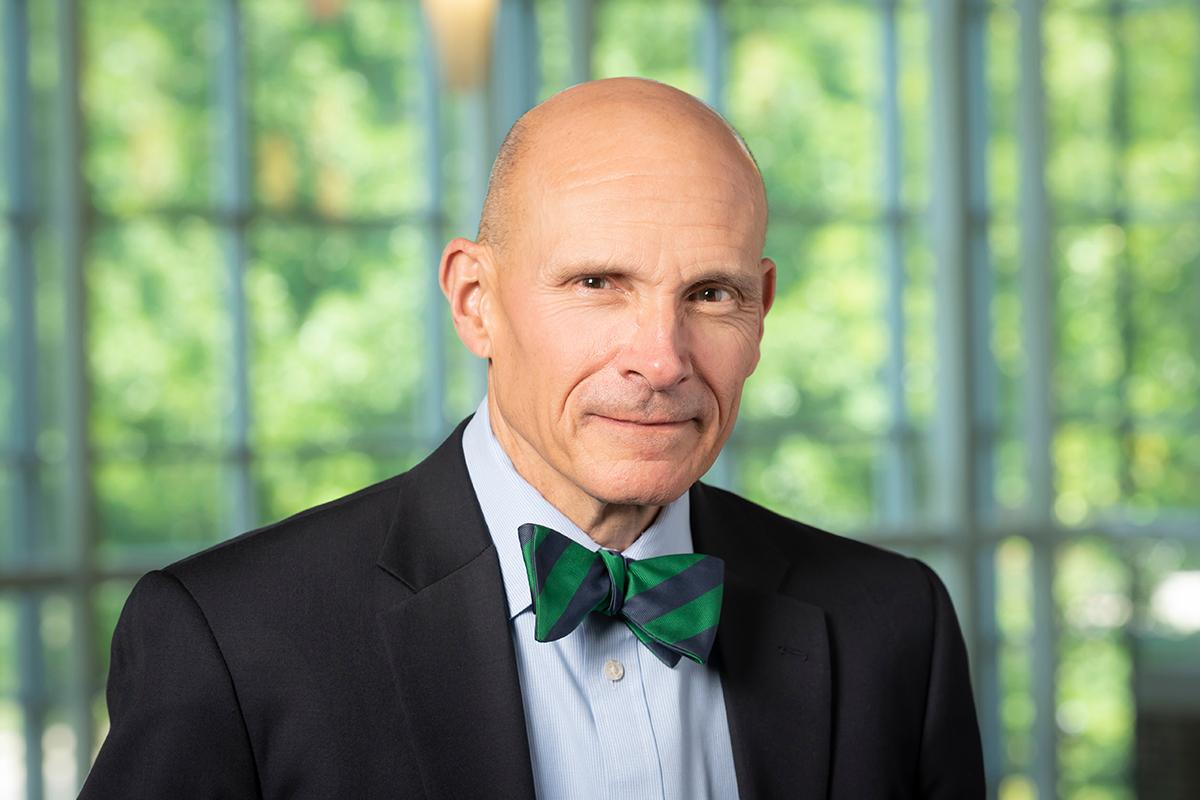
Judge Paul W. Grimm
U.S. District Court Judge Paul W. Grimm of the District of Maryland, a 2016 graduate of Duke Law’s Master of Judicial Studies program, will become the David F. Levi Director of the Bolch Judicial Institute and Professor of the Practice effective Jan. 1, 2023, succeeding David F. Levi, who has served as director since the Institute’s founding in 2018.
“Judge Grimm will be an inspiring leader for the Bolch Judicial Institute and an outstanding addition to the Duke Law faculty,” said Kerry Abrams, James B. Duke and Benjamin N. Duke Dean of the School of Law. “He not only brings a judge’s experience and insight gained from 25 years on the federal bench but also a scholar’s commitment to the study of the judiciary and judicial processes. Under David Levi’s leadership, and in just a few short years, the Institute has become a leading voice for strengthening the rule of law, advancing judicial independence, and studying and improving the administration of justice. Judge Grimm brings the experience, enthusiasm, and vision needed to take it into its next phase. I look forward to working with him.”
Judge Grimm served 25 years as a federal judge; he was a magistrate judge for 15 years prior to his appointment to the district court in 2012. A widely recognized expert on electronic evidence, discovery, and civil procedure, Judge Grimm has served on the Advisory Committee for the Federal Rules of Civil Procedure and has taught courses on evidence and civil procedure at the University of Maryland School of Law and the University of Baltimore School of Law. He is a retired lieutenant colonel of the United States Army and served as a Judge Advocate General’s (JAG) Corps officer on active duty and in the U.S. Army Reserve.
“It is an enormous honor to be joining this extraordinary faculty, led by such a dynamic dean, and to be able to work with them and the students at Duke,” said Judge Grimm. “To be able to work with the Bolch Judicial Institute to promote and further the visionary accomplishments that David Levi has achieved is the opportunity of a lifetime. I look forward to bringing on board new initiatives that will strengthen the rule of law and judicial independence, both at home and abroad. I am profoundly grateful for the generosity of Carl and Susan Bolch and all our donors who have made it possible for the Institute to achieve so much in such a short time.”
programs
Distinguished Judges in Residence
The Institute hosted two distinguished judges in residence this year: Judge Diane P. Wood of the U.S. Court of Appeals for the Seventh Circuit, who visited virtually, and Senior Judge Gerald B. Tjoflat (pictured above) of the U.S. Court of Appeals for the Eleventh Circuit, who came to campus. As part of their residencies, each judge participated in courses with students and faculty, joined David F. Levi for an interview for his Judgment Calls podcast, and met with student groups.
Judicial Administration Roundtable
The Institute hosted another Judicial Administration/Judicial Process Roundtable at Duke Law School, led by Professor Marin K. Levy. This year’s gathering included 20 leading and emerging scholars of the field who shared works-in-progress on important questions of court design, procedure, and judicial decision-making. The annual conference has become a well-known and highly respected program in the few years since its launch, establishing a reputation as the country’s leading annual program for judicial administration scholars.
The Raphael Lemkin Rule of Law Guardian

Professor James E. Coleman Jr. receives the Lemkin Medal at Duke Law School.
James E. Coleman Jr. received the 2022 Raphael Lemkin Rule of Law Guardian Medal on Sept. 7 during a ceremony held at Duke Law School. The John S. Bradway Professor of the Practice of Law, director of the Center for Criminal Justice and Professional Responsibility, and director of the Wrongful Convictions Clinic at Duke Law, Coleman has been a beloved member of the faculty for more than 25 years and is a nationally recognized leader in pursuing justice for the wrongfully convicted and for death penalty reform.
His career has been distinguished by his efforts to protect the constitutional rights of every person accused of a crime to a robust defense and to due process, whether for serial killer Ted Bundy, whom Coleman represented during death-row appeals in Florida, for three Duke’s men’s lacrosse players wrongly accused of rape, or for dozens of individuals serving long prison sentences for crimes they did not commit. Throughout his career and his time at Duke, Coleman has worked to ensure that the justice system is true to its constitutional commitments — often in the face of personal insults and threats.
“Professor Coleman has always stood for the highest ideals of our justice system,” says David F. Levi, Levi Family Professor of Law and Judicial Studies and director of the Bolch Judicial Institute at Duke Law. “He has shown generations of law students, as well as so many of his colleagues, that lawyers must stand for justice, even when the client is reviled by the public and stands accused by the government.”
“Over the years I have known Jim Coleman as an outstanding lawyer and committed professor and counselor to his students, and a brilliant advocate for the rights of the accused,” adds former Solicitor General Ted Olson. “He has been and is a beacon of leadership in the field of civil rights and a courageous advocate for those in need of legal assistance, particularly individuals who are the object of public anger, misunderstanding, and antipathy.”
The Lemkin Rule of Law Guardian Medal honors individuals who work to protect the rule of law in their everyday work, in ways large and small. It is named for Raphael Lemkin, a one-time Duke Law faculty member and one of the leading 20th-century scholars of human rights. The Bolch Judicial Institute honored Benjamin Ferencz, the last living Nuremberg Trial prosecutor, with the inaugural Lemkin Medal in 2020.
“If I could’ve picked anything about my career that would have been special to me to be recognized, it would be being a guardian of the rule of law,” Coleman said during the medal ceremony. “I hold myself responsible in holding others accountable.”
civic education
Judicature
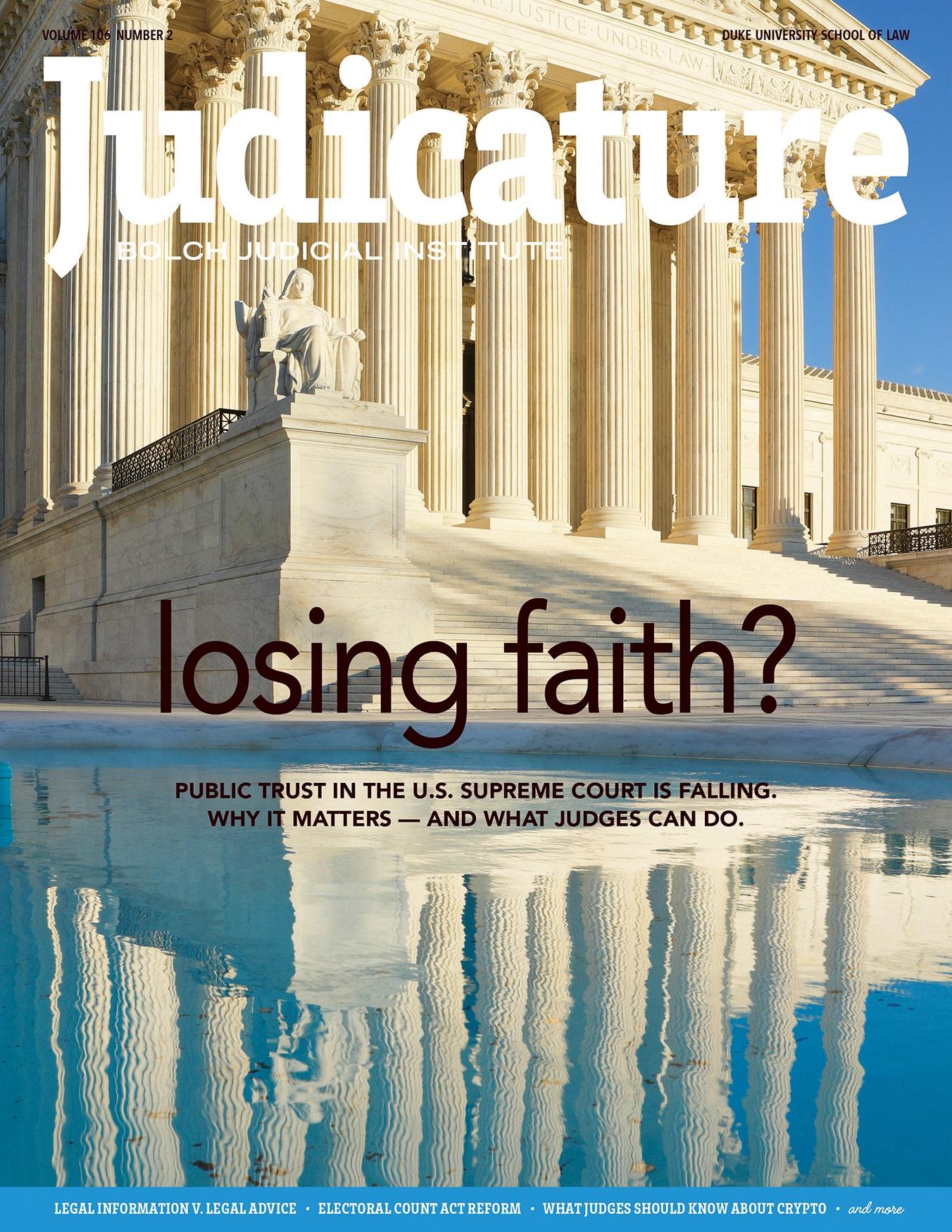 The Institute published three editions of Judicature, our scholarly journal about judges and judging, under the guidance of the editorial board chair, Judge Don R. Willett of the U.S. Court of Appeals for the Fifth Circuit (MJS Class of 2016). With support from dozens of law firms and donors, each edition of Judicature is mailed to all federal judges, all state supreme court justices, most state appellate judges, and complex litigation judges in 15 major markets.
The Institute published three editions of Judicature, our scholarly journal about judges and judging, under the guidance of the editorial board chair, Judge Don R. Willett of the U.S. Court of Appeals for the Fifth Circuit (MJS Class of 2016). With support from dozens of law firms and donors, each edition of Judicature is mailed to all federal judges, all state supreme court justices, most state appellate judges, and complex litigation judges in 15 major markets.
This year, the entire Duke-published archive of Judicature articles was made available online to the public for free, resulting in a 250% increase in website traffic and 121,000+ total users. International readers comprise the fastest-growing segment of Judicature’s online audience. To address this constituency, an international online edition of Judicature launched in November 2021.
Judgment Calls Podcast
 Judgment Calls featured interviews with six judges this year, including U.S. Supreme Court Justice Stephen Breyer (retired), Judge J. Clifford Wallace of the U.S. Court of Appeals for the Ninth Circuit, and Judge Diane Wood of the U.S. Court of Appeals for the Seventh Circuit. Judge Wood’s podcast garnered national media attention, which drove more than 400 podcast downloads within days of launch and garnered 270+ new followers on our Twitter accounts.
Judgment Calls featured interviews with six judges this year, including U.S. Supreme Court Justice Stephen Breyer (retired), Judge J. Clifford Wallace of the U.S. Court of Appeals for the Ninth Circuit, and Judge Diane Wood of the U.S. Court of Appeals for the Seventh Circuit. Judge Wood’s podcast garnered national media attention, which drove more than 400 podcast downloads within days of launch and garnered 270+ new followers on our Twitter accounts.
Social Media
The Bolch Prize for the Rule of Law

Judge J. Clifford Wallace speaks at the 2022 Bolch Prize ceremony.
The Hon. J. Clifford Wallace, chief judge emeritus of the U.S. Court of Appeals for the Ninth Circuit, received the 2022 Bolch Prize for the Rule of Law during a ceremony in San Diego, Calif., on Friday, March 18. The ceremony featured remarks from several distinguished speakers, including colleagues from the J. Clifford Wallace Inn of Court, who paid tribute to Judge Wallace’s tireless service to the courts and to the rule of law.
Through more than 50 years of service as a federal judge, Judge Wallace has led multiple efforts to improve the administration of justice in his circuit and in the federal courts, served his community and church through a wide variety of leadership roles, and advised judiciaries around the world on the development of the rule of law and the administration of justice. He has traveled to more than 70 countries, often at his own expense, to advise and work with judges and governments to strengthen judicial processes, improve court structures, and develop innovative solutions to logistical and legal challenges.
Speakers at the ceremony included Judge M. Margaret McKeown of the U.S. Court of Appeals for the Ninth Circuit; Judge David Campbell of the U.S. District Court for the District of Arizona; Manuel Sager, a former ambassador to the United States from Switzerland and a member of the Bolch Judicial Institute’s Advisory Board; D. Todd Christofferson, a leader of The Church of Jesus Christ of Latter-day Saints and a 1972 graduate of Duke Law School; Susan Bass Bolch, co-founder of the Bolch Judicial Institute; and David F. Levi, director of the Bolch Judicial Institute and a former U.S. District Judge of the Eastern District of California, where he was a colleague of Judge Wallace’s. Each praised Judge Wallace’s contributions to the rule of law around the globe, noting that as he helps to improve judicial systems from China to Pakistan to Uganda to Russia, Judge Wallace helps improve the societies and communities in which the courts operate.
“Cliff has always been focused on the fact that the rule of law is ultimately not just something for lawyers, it’s actually something for people who need justice,” said Singapore Supreme Court Chief Justice Sundaresh Menon by video. “You can have the best system in the world, but if you can’t access it because it is too arcane or too alien in any of a number of ways, it just remains a theoretical construct. Cliff’s work has focused on getting this message across to judges, and in particular, to chief justices, who, as people who head judiciaries, have the opportunity to shape their systems in such a way that they can actually take steps to deliver the values by implementing policy changes. I can’t think of a better recipient of this prize.”
Judge Wallace said he has focused his life’s work on strengthening the rule of law because it offers “the hope of fundamental fairness, distinguished from a rule developed by an individual such as a political executive or some other person in power.” But, he said, the rule of law cannot be effective in countries that do not have a separate, independent judicial system to enforce laws. “However well-intentioned each country’s constitution and declarations may be, the judiciary must be strong enough to implement the rule of law. It was this realization that started me on the path 50 years ago of strengthening judiciaries worldwide, so that the rule of law could be implemented. My five decades with this effort has taught me that we will never finish with this project. There will always be more to be done, in some country somewhere, to strengthen a judiciary, so the judiciary in turn can protect the rule of law.”

Thank you for supporting the Bolch Judicial Institute in 2022! Below are ways to support our mission and programs in 2023.
Give
Financial contributions from individuals and organizations provide critical support for our programs.
Subscribe
Join our mailing list to receive our quarterly e-newsletter and other important updates from the Bolch Judicial Institute.
Follow
Connect with us on social media for news and updates related to the rule of law and the administration of justice.

